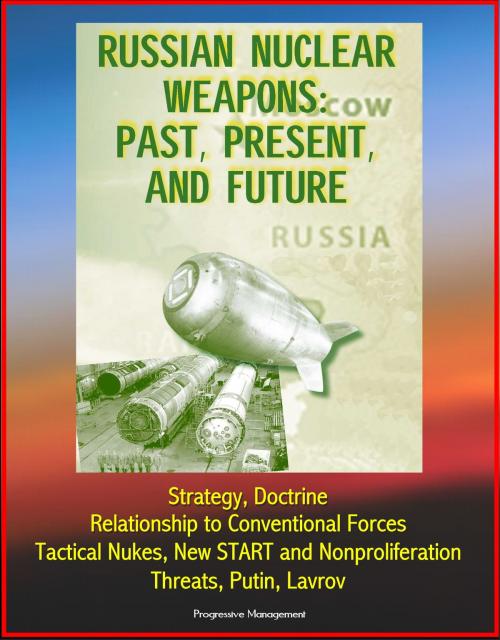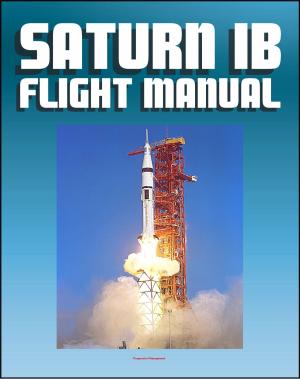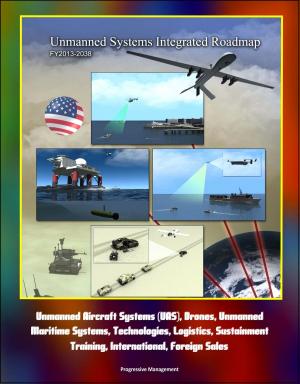Russian Nuclear Weapons: Past, Present, and Future - Strategy, Doctrine, Relationship to Conventional Forces, Tactical Nukes, New START and Nonproliferation, Threats, Putin, Lavrov
Nonfiction, History, Military, Nuclear Warfare, Asian, Russia| Author: | Progressive Management | ISBN: | 9781311518354 |
| Publisher: | Progressive Management | Publication: | March 11, 2014 |
| Imprint: | Smashwords Edition | Language: | English |
| Author: | Progressive Management |
| ISBN: | 9781311518354 |
| Publisher: | Progressive Management |
| Publication: | March 11, 2014 |
| Imprint: | Smashwords Edition |
| Language: | English |
This important report from the U.S. Army's Strategic Studies Institute provides unique insights into the Russian nuclear arsenal, arms control, and American-Russian relationships. Russian Nuclear Weapons: Past, Present, and Future * 1. Russian Nuclear and Conventional Weapons: The Broken Relationship * 2. Russia's Conventional Armed Forces: Reform and Nuclear Posture to 2020 * 3. Nuclear Weapons in Russian Strategy and Doctrine * 4. Russia's Security Relations with the United States: Futures Planned and Unplanned * 5. Nuclear Weapons in Russian National Security Strategy * 6. Caught between Scylla and Charybdis: The Relationship between Conventional and Nuclear Capabilities in Russian Military Thought * 7. Russia and Nuclear Weapons * 8. Russian Tactical Nuclear Weapons: Current Policies and Future Trends * 9. New START and Nonproliferation: Suitors or Separate Tables? * 10. Russia's Nuclear Posture and the Threat that Dare Not Speak its Name * Hillary Clinton, Vladimir Putin, Sergey Lavrov Russian Minister of Foreign Affairs.
While the Cold War is long past, the importance of arms control in Russo-American relations and the related issue of nuclear weapons for Russia remain vital concerns. Indeed, without an appreciation of the multiple dimensions of the latter, progress in the former domain is inconceivable. With this in mind, the Strategic Studies Institute (SSI) is very pleased to present the following essays, which explore many, if not all, of the issues connected with Russia's relatively greater reliance on nuclear weapons for its security. As such, they constitute an important contribution to the analysis of the Obama administration's reset policy, Russo-American relations, Russian foreign and defense policy, and international security in both Europe and Asia. Additionally, questions concerning the approach taken by other nuclear power nations in reference to the arms control agenda provide a crucial backdrop for the progress toward curbing the proliferation of nuclear weapons, a long-standing central goal of U.S. security policy. We offer these essays to our readers in the belief that the information and analyses contained herein will strengthen our understanding of Russia's extensive nuclear agenda and provide a deeper understanding of the many issues in international security connected with Russia and its nuclear posture.
Dale Herspring and Roger McDermott present a systematic exposition and analysis of the reforms of the conventional forces and the impact this might have on nuclear issues. Andrei Shoumikhin, Pavel Baev, and Nikolai Sokov closely examine the ways in which Russia has previously thought about nuclear weapons, how it does so at present, and as well as how it might think about them in the future. Daniel Goure and Stephen Blank analyze some of the larger strategic issues driving Russian security and defense policy and their connection to nuclear weapons. Stephen Cimbala relates both the U.S. and Russian structures to issues tied to nonproliferation and to what future reductions to a 1,000 warhead level might look like, while Jacob Kipp analyzes the deep-seated strategic challenges that Russia faces in its Asian-Pacific Far East. Richard Weitz provides an in-depth analysis of the vexing issue of tactical nuclear weapons (TNW) that are already a source of friction between the two sides and one that will figure prominently in any future arms control negotiation. In many cases, it will become clear that in the attempt to answer the questions asked of them, the authors of this book have produced a considerable amount of overlap, i.e., more than one author addressing the same point. However, what is equally as clear is that there is no agreement among them. There was a deliberate attempt to avoid a "pre-cooked" consensus. Rather, each author's individual view is asserted in their chapters, underscoring the inherent opacity of Russian programs and the different analytical approaches of each writer.
This important report from the U.S. Army's Strategic Studies Institute provides unique insights into the Russian nuclear arsenal, arms control, and American-Russian relationships. Russian Nuclear Weapons: Past, Present, and Future * 1. Russian Nuclear and Conventional Weapons: The Broken Relationship * 2. Russia's Conventional Armed Forces: Reform and Nuclear Posture to 2020 * 3. Nuclear Weapons in Russian Strategy and Doctrine * 4. Russia's Security Relations with the United States: Futures Planned and Unplanned * 5. Nuclear Weapons in Russian National Security Strategy * 6. Caught between Scylla and Charybdis: The Relationship between Conventional and Nuclear Capabilities in Russian Military Thought * 7. Russia and Nuclear Weapons * 8. Russian Tactical Nuclear Weapons: Current Policies and Future Trends * 9. New START and Nonproliferation: Suitors or Separate Tables? * 10. Russia's Nuclear Posture and the Threat that Dare Not Speak its Name * Hillary Clinton, Vladimir Putin, Sergey Lavrov Russian Minister of Foreign Affairs.
While the Cold War is long past, the importance of arms control in Russo-American relations and the related issue of nuclear weapons for Russia remain vital concerns. Indeed, without an appreciation of the multiple dimensions of the latter, progress in the former domain is inconceivable. With this in mind, the Strategic Studies Institute (SSI) is very pleased to present the following essays, which explore many, if not all, of the issues connected with Russia's relatively greater reliance on nuclear weapons for its security. As such, they constitute an important contribution to the analysis of the Obama administration's reset policy, Russo-American relations, Russian foreign and defense policy, and international security in both Europe and Asia. Additionally, questions concerning the approach taken by other nuclear power nations in reference to the arms control agenda provide a crucial backdrop for the progress toward curbing the proliferation of nuclear weapons, a long-standing central goal of U.S. security policy. We offer these essays to our readers in the belief that the information and analyses contained herein will strengthen our understanding of Russia's extensive nuclear agenda and provide a deeper understanding of the many issues in international security connected with Russia and its nuclear posture.
Dale Herspring and Roger McDermott present a systematic exposition and analysis of the reforms of the conventional forces and the impact this might have on nuclear issues. Andrei Shoumikhin, Pavel Baev, and Nikolai Sokov closely examine the ways in which Russia has previously thought about nuclear weapons, how it does so at present, and as well as how it might think about them in the future. Daniel Goure and Stephen Blank analyze some of the larger strategic issues driving Russian security and defense policy and their connection to nuclear weapons. Stephen Cimbala relates both the U.S. and Russian structures to issues tied to nonproliferation and to what future reductions to a 1,000 warhead level might look like, while Jacob Kipp analyzes the deep-seated strategic challenges that Russia faces in its Asian-Pacific Far East. Richard Weitz provides an in-depth analysis of the vexing issue of tactical nuclear weapons (TNW) that are already a source of friction between the two sides and one that will figure prominently in any future arms control negotiation. In many cases, it will become clear that in the attempt to answer the questions asked of them, the authors of this book have produced a considerable amount of overlap, i.e., more than one author addressing the same point. However, what is equally as clear is that there is no agreement among them. There was a deliberate attempt to avoid a "pre-cooked" consensus. Rather, each author's individual view is asserted in their chapters, underscoring the inherent opacity of Russian programs and the different analytical approaches of each writer.















